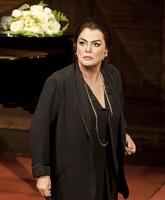Master Class
First performed almost 2 decades ago in 1995, Terrence McNally's 'Master Class' won the Tony Award for best play the following year. Here, it is revived with Tyne Daly in the lead as the world-famous opera singer Maria Callas (1923-1977).
Now before we go any further, let me confess to knowing little about opera - I could easily write everything I know about that art form on the back of a postage stamp in a font size of 60 or even greater. But that really does not matter, because this is not fundamentally about opera, it is a play about a woman, and an extraordinary woman at that, who happened to be one of the greatest opera singers of all time. So, if you're not exactly a fan of opera, don't be put off because the sheer joy here is to be found in Tyne Daly's mesmerising portrayal. And there's the added bonus of some fine singing from Dianne Pilkington, and the enormously powerful voice of Garret Sorenson.
The format for the play - which is pretty obvious from the title - is that Maria Callas is delivering master classes in opera singing to a number of students. Three of them put themselves and their voices under the eagle eye and inscrutable ear of La Divina. These master classes took place at the Juilliard School, New York between October 1971 and March 1972. Much of the focus is, however, not on the students, but on Ms Callas's life, work and personality. In between advising the students - or, to put it more accurately, berating them - we see flashbacks of Ms Callas on the massive stages of opera houses where she reveals more about her relationships, particularly with Aristotle Onassis, the enormously wealthy Greek shipping magnate who was to be her lover for almost a decade.
My recollections of Tyne Daly emanate from her time as the homely, down-to-earth Detective Mary Beth Lacey in the award-winning American TV series 'Cagney and Lacey'. No wonder that the series won numerous gongs, because Ms Daly is one of those actors who simply defines professionalism and has an incredible ability to really get under the skin of a character, which is exactly what she does here.
Researching Madam Callas's work led me to a video interview she did when she was almost the same age as she was when she delivered the master classes at Juilliard. Judging from Ms Daly's characterisation, I would think she watched the same interview in which Madam Callas had to endure rude and pointed questions which delved rather too brusquely into private affairs. However, she answered all the questions with dignified poise and what certainly seemed like total honesty. And that is very much what Tyne Daly brings to this role. At times, she is certainly overbearing and domineering, and there are moments when she is arrogant and issues wonderfully-timed put-downs to the students. But Ms Daly is also able to bring us to understand Ms Callas's obsession with opera and her instinctive ability to read what a composer had laid-down in the score to enable her to interpret the work. But when we see her alone in the stage flashbacks, she is immensely vulnerable, tiny and alone.
Rating plays is a complex business because there are often conflicting considerations which have to be weighed-up. Here, I do not think the script quite matches up to Ms Daly's riveting performance. Mr McNally obviously set-out to reveal the woman as much as the belligerent diva in Ms Callas, but the format is somewhat restrictive because it tends to reinforce the negative aspects of Ms Callas's reputation. If we had been able to see her interacting with her husband or with Onassis, we might have had chance to discover a different persona - but that might have been a very different play, of course. Nevertheless, there is enough in the script to produce numerous insights, for example about her early years as a student. And Tyne Daly certainly found enough in it too, to make the central role and the play truly her own in a vivid and memorable performance.
(Peter Brown)
"Debased, cliche-ridden version of Callas...Let me say at the outset that Tyne Daly is astonishingly good at what she is asked to do for this show."
Paul Taylor for The Independent
"I don't think anyone could claim that Terrence McNally's Master Class is a great play. It's sentimental, full of dramatic and verbal clichés, and doesn't tell us much about Maria Callas that even I, an ignoramus when it comes to opera, didn't know already. Yet there is no denying that it offers a guiltily enjoyable night at the theatre....This may be a flawed and even dishonest play, but it is a highly entertaining one, and Tyne Daly richly deserves her standing ovation "
Charles Spencer for The Telegraph
"Even if Tyne Daly's performance far surpasses the one we saw from Patti LuPone in 1997, the play still offers a caricature of what we know of the real Callas...Against the odds, Daly gives the evening the touch of class that McNally's script lacks."
Michael Billington for The Guardian
"It is spellbindingly performed by Daly."
Mark Shenton for The Stage
"Daly is imperious and sometimes woundingly funny...Terrence McNally's play is less majestic. It's a clever yet rather vulgar and overly sentimental homage to the great diva"
Henry Hitchings for The Evening Standard
External links to full reviews from popular press
Telegraph - Guardian - Independent
Originally published on
